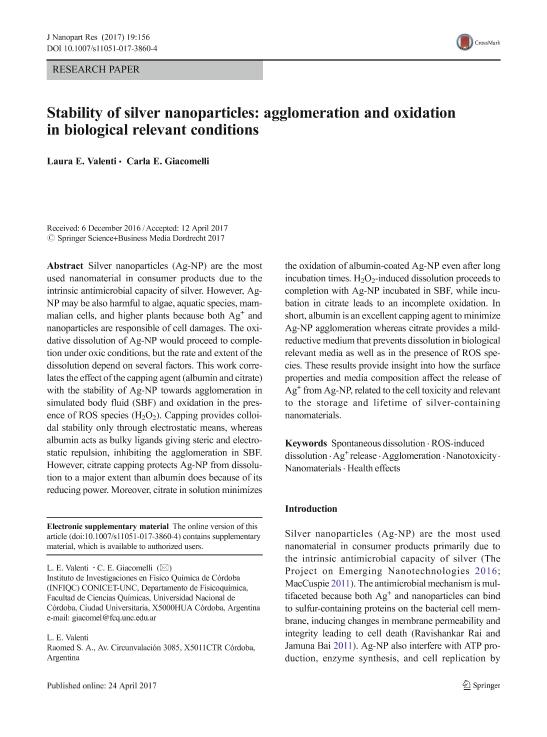Mostrar el registro sencillo del ítem
dc.contributor.author
Valenti, Laura Elisa

dc.contributor.author
Giacomelli, Carla Eugenia

dc.date.available
2019-04-29T18:05:13Z
dc.date.issued
2017-05
dc.identifier.citation
Valenti, Laura Elisa; Giacomelli, Carla Eugenia; Stability of silver nanoparticles: agglomeration and oxidation in biological relevant conditions; Springer; Journal of Nanoparticle Research; 19; 5; 5-2017
dc.identifier.issn
1388-0764
dc.identifier.uri
http://hdl.handle.net/11336/75225
dc.description.abstract
Silver nanoparticles (Ag-NP) are the most used nanomaterial in consumer products due to the intrinsic antimicrobial capacity of silver. However, Ag-NP may be also harmful to algae, aquatic species, mammalian cells, and higher plants because both Ag+ and nanoparticles are responsible of cell damages. The oxidative dissolution of Ag-NP would proceed to completion under oxic conditions, but the rate and extent of the dissolution depend on several factors. This work correlates the effect of the capping agent (albumin and citrate) with the stability of Ag-NP towards agglomeration in simulated body fluid (SBF) and oxidation in the presence of ROS species (H2O2). Capping provides colloidal stability only through electrostatic means, whereas albumin acts as bulky ligands giving steric and electrostatic repulsion, inhibiting the agglomeration in SBF. However, citrate capping protects Ag-NP from dissolution to a major extent than albumin does because of its reducing power. Moreover, citrate in solution minimizes the oxidation of albumin-coated Ag-NP even after long incubation times. H2O2-induced dissolution proceeds to completion with Ag-NP incubated in SBF, while incubation in citrate leads to an incomplete oxidation. In short, albumin is an excellent capping agent to minimize Ag-NP agglomeration whereas citrate provides a mild-reductive medium that prevents dissolution in biological relevant media as well as in the presence of ROS species. These results provide insight into how the surface properties and media composition affect the release of Ag+ from Ag-NP, related to the cell toxicity and relevant to the storage and lifetime of silver-containing nanomaterials.
dc.format
application/pdf
dc.language.iso
eng
dc.publisher
Springer

dc.rights
info:eu-repo/semantics/openAccess
dc.rights.uri
https://creativecommons.org/licenses/by-nc-sa/2.5/ar/
dc.subject
Ag+ Release
dc.subject
Agglomeration
dc.subject
Health Effects
dc.subject
Nanomaterials
dc.subject
Nanotoxicity
dc.subject
Ros-Induced Dissolution
dc.subject
Spontaneous Dissolution
dc.subject.classification
Otras Ciencias Químicas

dc.subject.classification
Ciencias Químicas

dc.subject.classification
CIENCIAS NATURALES Y EXACTAS

dc.title
Stability of silver nanoparticles: agglomeration and oxidation in biological relevant conditions
dc.type
info:eu-repo/semantics/article
dc.type
info:ar-repo/semantics/artículo
dc.type
info:eu-repo/semantics/publishedVersion
dc.date.updated
2019-04-16T20:38:12Z
dc.identifier.eissn
1572-896X
dc.journal.volume
19
dc.journal.number
5
dc.journal.pais
Suiza

dc.description.fil
Fil: Valenti, Laura Elisa. Consejo Nacional de Investigaciones Científicas y Técnicas. Centro Científico Tecnológico Conicet - Córdoba. Instituto de Investigaciones en Físico-química de Córdoba. Universidad Nacional de Córdoba. Facultad de Ciencias Químicas. Instituto de Investigaciones en Físico-química de Córdoba; Argentina. Raomed S. A.; Argentina
dc.description.fil
Fil: Giacomelli, Carla Eugenia. Consejo Nacional de Investigaciones Científicas y Técnicas. Centro Científico Tecnológico Conicet - Córdoba. Instituto de Investigaciones en Físico-química de Córdoba. Universidad Nacional de Córdoba. Facultad de Ciencias Químicas. Instituto de Investigaciones en Físico-química de Córdoba; Argentina
dc.journal.title
Journal of Nanoparticle Research

dc.relation.alternativeid
info:eu-repo/semantics/altIdentifier/doi/http://dx.doi.org/10.1007/s11051-017-3860-4
dc.relation.alternativeid
info:eu-repo/semantics/altIdentifier/url/https://link.springer.com/article/10.1007%2Fs11051-017-3860-4
Archivos asociados
